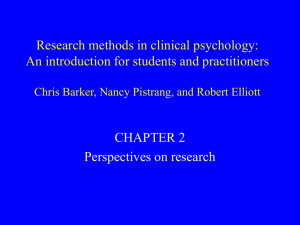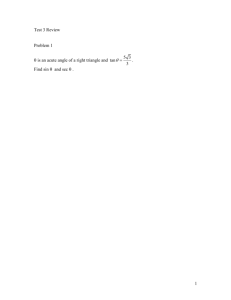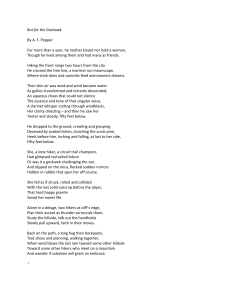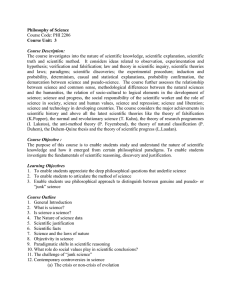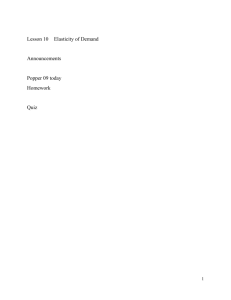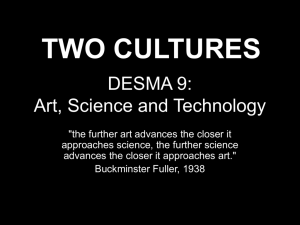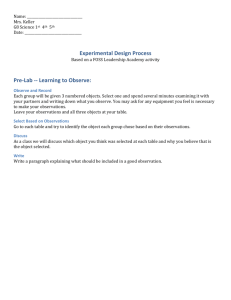METHODOLOGY OF ECONOMICS: REFLECTIONS ON BLAUG’S SUGGESTIONS FOR A REVISED EDITION
advertisement
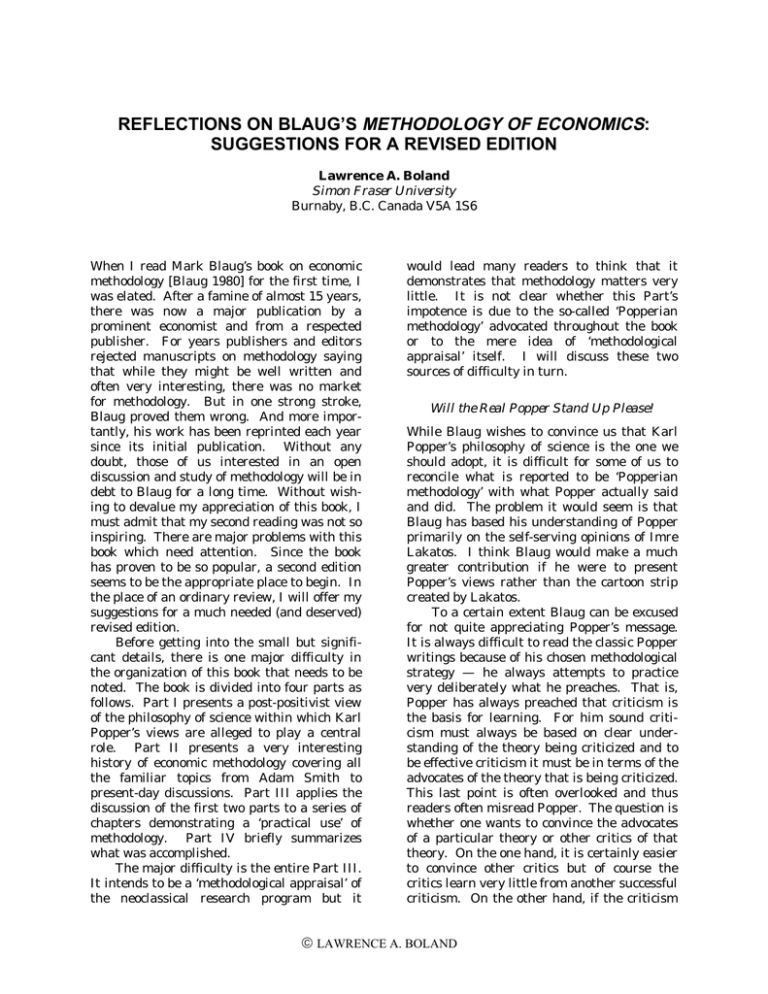
REFLECTIONS ON BLAUG’S METHODOLOGY OF ECONOMICS: SUGGESTIONS FOR A REVISED EDITION Lawrence A. Boland Simon Fraser University Burnaby, B.C. Canada V5A 1S6 When I read Mark Blaug’s book on economic methodology [Blaug 1980] for the first time, I was elated. After a famine of almost 15 years, there was now a major publication by a prominent economist and from a respected publisher. For years publishers and editors rejected manuscripts on methodology saying that while they might be well written and often very interesting, there was no market for methodology. But in one strong stroke, Blaug proved them wrong. And more importantly, his work has been reprinted each year since its initial publication. Without any doubt, those of us interested in an open discussion and study of methodology will be in debt to Blaug for a long time. Without wishing to devalue my appreciation of this book, I must admit that my second reading was not so inspiring. There are major problems with this book which need attention. Since the book has proven to be so popular, a second edition seems to be the appropriate place to begin. In the place of an ordinary review, I will offer my suggestions for a much needed (and deserved) revised edition. Before getting into the small but significant details, there is one major difficulty in the organization of this book that needs to be noted. The book is divided into four parts as follows. Part I presents a post-positivist view of the philosophy of science within which Karl Popper’s views are alleged to play a central role. Part II presents a very interesting history of economic methodology covering all the familiar topics from Adam Smith to present-day discussions. Part III applies the discussion of the first two parts to a series of chapters demonstrating a ‘practical use’ of methodology. Part IV briefly summarizes what was accomplished. The major difficulty is the entire Part III. It intends to be a ‘methodological appraisal’ of the neoclassical research program but it would lead many readers to think that it demonstrates that methodology matters very little. It is not clear whether this Part’s impotence is due to the so-called ‘Popperian methodology’ advocated throughout the book or to the mere idea of ‘methodological appraisal’ itself. I will discuss these two sources of difficulty in turn. Will the Real Popper Stand Up Please! While Blaug wishes to convince us that Karl Popper’s philosophy of science is the one we should adopt, it is difficult for some of us to reconcile what is reported to be ‘Popperian methodology’ with what Popper actually said and did. The problem it would seem is that Blaug has based his understanding of Popper primarily on the self-serving opinions of Imre Lakatos. I think Blaug would make a much greater contribution if he were to present Popper’s views rather than the cartoon strip created by Lakatos. To a certain extent Blaug can be excused for not quite appreciating Popper’s message. It is always difficult to read the classic Popper writings because of his chosen methodological strategy — he always attempts to practice very deliberately what he preaches. That is, Popper has always preached that criticism is the basis for learning. For him sound criticism must always be based on clear understanding of the theory being criticized and to be effective criticism it must be in terms of the advocates of the theory that is being criticized. This last point is often overlooked and thus readers often misread Popper. The question is whether one wants to convince the advocates of a particular theory or other critics of that theory. On the one hand, it is certainly easier to convince other critics but of course the critics learn very little from another successful criticism. On the other hand, if the criticism LAWRENCE A. BOLAND 2 is correct, advocates have a lot to learn. Thus, if we are to make a significant contribution to learning, we should try to convince the advocates. Beginning in the 1930s, this approach to learning through criticism is what Popper, with his Logic of Scientific Discovery, consistently attempted to employ. He attempted to convince the Vienna Circle of logical positivists (or whatever they are called) that if there is a methodological means of demarcating science from metaphysics, for purely logical reasons it would have to be falsifiability rather than verifiability. Similarly, if observations matter, it would be refuting observations rather than confirming observations. Again, the argument is a matter of logic. The questions of demarcation and whether observations are the foundation of knowledge were matters of concern for Vienna Circle and thus were the objects of Popper’s criticism. They were not necessarily a major issue for Popper’s understanding of science or methodology [see Bartley 1968]. What is important to appreciate is that Popper’s criticism of the Vienna Circle’s methodology is presented on their terms. This approach to learning and criticism makes Popper’s works very difficult to read and leads many readers to attribute viewpoints to him which are actually those of the advocates being criticized. The best example of this is his book Poverty of Historicism which he presents several views of history. After each presentation he offers his criticism. I have seen quotations taken from this book, supposedly stating Popper’s view when, in fact, the quotation was taken from one of his presentations and thus was actually representing a view with which he disagreed. Of course, the source of this problem is Popper’s chosen approach. While his approach may involve logically sound criticisms, it is too often an excessively risky form of rhetoric. Throughout his book Blaug refers to what he calls a Popperian methodology of falsificationism. I cannot figure out just what this socalled methodology is. Popper repeatedly criticizes the view that there is some method to invoke which will assure a certain outcome no matter who uses it. What is the purpose of such a methodology? What does it supposedly accomplish? Years ago I tried to explain why it is easy to be misled by the methodological requirement of falsifiability [Boland 1977]. Paradoxically, verificationists are more interested than anyone else in falsifiability. The reason is that it is all too easy to accuse verificationists of being satisfied with verifications of tautologies since a tautology will always fit the facts Thus, in order to avoid the embarrassment of claiming one’s theory has been verified only to find out that it was a tautology, verificationists now require every theory to be falsifiable. This is a very useful methodological rule since tautologies are never falsifiable — i.e., as a matter of logic they cannot be false. In other words, the requirement of falsifiability is the solution to a verificationist’s methodological problem. I still cannot see any other reason to advocate a ‘methodology of falsificationism’. The idea of a Popperian methodology based on falsifiability is more attributable to Lakatos than to Popper. Popper does not offer an alternative method of providing a sound foundation for our knowledge — to the contrary, he has repeatedly criticized the view that we need such a foundation. A foundation consisting of all the confirming evidence or refuting evidence in the practical world will never prove the truth or falsity of our knowledge. This does not mean that our knowledge cannot be true or false nor that we should not be concerned about the truth or falsity of our knowledge. A true theory may very well be less falsifiable than a competing false theory. And the more falsifiable false theory may be difficult to falsify for practical reasons no matter how much we attempt to do so. Thus appraising a theory on the basis of its falsifiability can be very misleading [see Wisdom 1963]. If by advocating a ‘Popperian methodology’ we are being urged to put questions of falsifiability ahead of any other concern, then such a methodology may turn out to be very unproductive. What is important to recognize here is that the view which emphasizes the progressive role of falsification is nothing but a sophisticated version of the belief that there is a mechanical (and objective) method which will always bring us eventually closer to the true theory we want. That mechanical method is the inductivism that Popper has so consistently criticized. The problem that Popper was concerned with until a few years ago was the view that there exist some mechanical tool with which LAWRENCE A. BOLAND 3 we can measure the structure of a theory to appraise its truth status. There is no such tool, that is, no methodological criterion exists that can be used to pick the true theories from the false ones [see Boland 1971]. This is our problem but it is not necessarily a problem of the structure of our theories. Attempting to overcome this problem by fooling ourselves with invented criteria such as verifiability or falsifiability is just an exercise in the conventionalism that Popper warned us not to follow. And implying that the truth status of a theory can only be a matter of convention (supposedly since it can only be appraised as the best according to the accepted criteria) may make us feel better but it accomplishes nothing that could be considered intellectually interesting. As I read Popper, starting with his 1934 book (English edition 1959) and continuing through his 1972 Objective Knowledge, he is always against what he calls ‘conventionalism’. It is difficult to find this view of Popper as an anti-conventionalist in Blaug’s presentations in Part I. Instead we encounter a Popper who supposedly says something to the effect that for scientists ‘all “true” theories are merely provisionally true’ [Blaug 1980, p. 17]. Either a theory is true or it is false, so what does it mean to be ‘provisionally true’? Is it being alleged that Popper endorses the conventionalist concept of ‘provisionally true’ or that he rejects it? In one sense Blaug may be correct in presenting such a confused view of Popper since the confused view is the one most often entertained by economic methodologists who refer to Popper. That is, if Blaug is only attempting to explain how economists understand methodology, then he is correct. But, if he is trying to teach or advocate a consistent Popperian view of methodology, he should clear up these questions for the benefit of the general reader. (this question leads only to an even more sophisticated conventionalism). Rather we should ask why we need a ‘methodological appraisal’ of economic theory? To put this question into Popperian terms, what problem is solved by a methodological appraisal? It is all too easy to form a vision of the methodologist as a supreme judge sitting high on the bench wearing a long flowing black robe and perhaps, even a white wig. The methodologist’s job in this vision is to pass judgement on economic theories. According to Blaug the judge is not allowed to assess a theory in isolation but must decide between competing theories just as the courtroom judge must decide between the prosecution and the defense. It is just this view of methodology that Galileo challenged when the college of cardinals (acting as the judge) told him that for methodological reasons he had to teach Ptolemaic astronomy rather than introduce his students to the competing view of Copernicus. I agree with Galileo — methodologists are no better qualified than anyone else to assess the truth or falsity of a theory about the nature of the real world. Of course, there is a definite merit in requiring comparisons rather than singular judgements. To make a comparison one must recognize the existence of other viewpoints. At least, to a certain extent this avoids narrow-mindedness. But open-mindedness would have us go further to consider many theories and viewpoints and let the advocates make their cases. We may want to choose one theory but only when we need to. Of course, historians of economic thought think they need to choose one theory every time they put their pens on paper. And worse, textbook writers always find it easier to write about a single theory since students too often object to being put into a position where they have to think for themselves. Some Suggestions On the Utility of ‘Methodological Appraisal’ I think the only reason Blaug wishes to characterize the appropriate view of the philosophy of science as a methodology based on the conventionalist criterion of falsifiability is that he wishes to employ such a tool in the appraisal of economic research. The question of interest is not whether there is a better tool This brings us back to the problem with Part III. It might be better to relegate this ‘methodological appraisal’ to an appendix or eliminate it entirely. While it provides excellent summaries of many parts of the neoclassical research program as well as some competing programs, it adds nothing to our understanding of methodology. With very few LAWRENCE A. BOLAND 4 exceptions, methodology in these demonstrations never seems to matter to the proponents of the individual viewpoints discussed. If it does not matter to them, how can it matter to us? The only major exception is, of course, Paul Samuelson who explicitly proclaimed his methodological purposes. Perhaps instead of the 1980 Part III, Blaug could give us a reader’s guide to Samuelson’s Foundations. Perhaps he could also review the questionable methodological basis for the overwhelming dominance of mathematical model building in mainstream economics. He could, perhaps, give us a first hand report on why in the 1978 edition of his Economic Theory in Retrospect he said ‘Friedman is not guilty of “instrumentalism” ’ but just two years later in the 1980 book he told us about ‘the methodology of instrumentalism espoused by Friedman’. Without explanation, students of methodology must find this confusing. Fortunately, it is a matter which Blaug is in a good position to clarify. If Blaug follows my suggestions, I have no doubt that he will provide an invaluable textbook on economic methodology. If he does not, I think students of methodology would spend their time more fruitfully by studying the equally penetrating history of methodology provided by Bruce Caldwell [1982]. Caldwell, B. [1982] Beyond (Boston: Allen & Unwin) Positivism Popper, K. [1934/59] Logic of Scientific Discovery (New York: Science Editions) Popper, K. [1944/61] Poverty of Historicism (New York: Harper & Row) Popper, K. [1972] Objective (Oxford: Oxford Univ. Press) Knowledge Wisdom, J. [1963] The refutability of ‘irrefutable’ laws, British Journal for the Philosophy of Science, 13, 303-6 REFERENCES Bartley, W. [1968] Theories of demarcation between science and metaphysics, in I. Lakatos and A. Musgrave (eds) Problems in the Philosophy of Science (Amsterdam: North Holland), 40-64 Blaug, M. [1978] Economic Theory in Retrospect 3rd edn (Cambridge: Cambridge Univ. Press) Blaug, M. [1980] The Methodology of Economics (Cambridge: Cambridge Univ. Press) Boland, L. [1971] Methodology as an exercise in economic analysis, Philosophy of Science, 38, 105-17 Boland, L. [1977] Testability in economic science, South African Journal of Economics, 45, 93-105 LAWRENCE A. BOLAND
